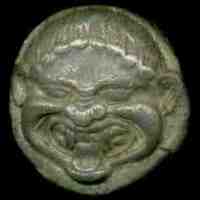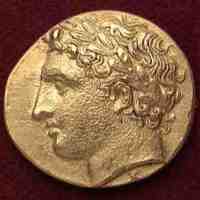
Gorgon's head on a
silver
coin
|
Classics
215:
Mythology
Fall 2008
|

The god Apollo on a
gold coin
of Syracuse
image courtesy of Edgar
L. Owen, #3803
|
Instructor: Dr. Victor A. Leuci
Texts:
Barry Powell, 2007, Classical
Mythology, 5th. Ed., Prentice Hall, Englewood Cliffs, NJ (Powell)
Website accompanying
Powel's
text: www.prenhall.com/powell
Scott Leonard &
Michael McClure, 2004, Myth and Knowing, McGraw Hill, Boston
(Leonard & McClure)
Objectives: The
purpose of this course is 1) to introduce you to principal myths of
Greece,
Rome, northern Europe, India, China, the Near East, the Amerindians,
and
others, and 2) to explore the functions and patterns of myth in various
ancient and modern cultures. An important goal of the course is
to
develop a critical perspective that will allow you to compare the myths
of different groups of people and to perceive the way in which certain
mythic patterns seem to be universal in scope and others to be
culturally
specific. In essence, everyone in the class should strive to
become
adept at listening to, reading, telling, and interpreting traditional
tales.
Relationship to the General Education
Curriculum (Tier II:
Artistic Expression
and Critical Appreciation Context-course in literature). Mythology is a
key backdrop to all Greco-Roman art and literature, as well as the
literature,
written and oral, of almost all cultures, so the material studied will,
by definition, be representative of significant movements and periods,
as well as key themes and figures. As stated in the Objectives above
one
goal of the course is to develop a critical perspective which will
involve
developing the students’ ability to analyze and discuss the material
using
key terminology and a variety of approaches. Understanding a society’s
mythology is often essential in understanding that society and its
concommittant
culture since cultures often use myths as a key way of examining the
human
condition. Thus through this study of mythology, students will explore
the relationship between art and society in order to gain insight into
cultural aspects of society and develop a perspective that enhances
understanding
of the human condition. A study of mythology, with the importance of
reading
parts of significant works of literature and looking at how mythology
was
a key mover in the arts in general, cannot but help to promote an
appreciation
of the arts.
Writing Intensive
Option:Different
types of writing will be part of the course: short papers and exams
that
are predominately essay (2 of which must be the take-home versions).
Six short papers will be assigned as a means to help
participants
come to a better understanding of important themes, ideas, and
concepts.
The first short paper will be revised on the basis of a conference with
me. Two other short papers must be revised on the basis of conferences
with me and with a tutor at the Writing Lab. A critique and conference
after the completion of a paper may also occur. Note: when turning in the
final copy of a paper, the draft with comments by me and/or the writing
lab must be turned in at the same time--it goes without saying that the
final paper must be revised based on the comments and conference(s) on
the draft(s). In
general,
participants
in the class should highly consider using the services of the Writing
Lab
and especially the Lab tutors, who can be of tremendous assistance. To
summarize:
- 3 papers revised
with me
- 2 papers revises
with Writing Lab tutors
- 2 exams as
take-home version
Format: The
course will
consist of both lectures and discussion. More than three
unexcused
absences will be considered excessive, and no make-up work will be
accepted
for unexcused absences.
Grading:
- Exams: 4
total, 70 points
each; your lowest score will be dropped.
- Papers: 6
total; 600-900
words in length; 30 points each; your lowest score will be
dropped. These
may
form an important part of class discussion.
- Final: The final is the simple the last
of the exams.
- Class
Participation: 40
points; will also include posts in class discussion folder
Honor Code: All
students and faculty must adhere to the Honor Code; please see the
Student
Life Handbook for the full description of the Honor Code--p. 21
in
the Student Life Handbook gives a short definition: "No Westminster
student
shall commit any act of academic dishonesty in order to advance her or
his own academic performance, or to impede or advance the academic
progress
of others," but the sections on plagiarism and cheating are especially
important (see Honor Commission Constitution, Article IX).
ADA
Accommodation:
Any
student who feels that he or she may need an accommodation based on the
impact of a disability should contact me to arrange an appointment as
soon
as possible. At that time, we can discuss the course format,
anticipate
your needs, and explore possible accommodations. Westminster's ADA policy can be
found at the College's website (click
here)
Exams:
- In-class version:
The exams
will be a combination of fill-in the blank and/or matching (20 pts)
with one essay (50 pts).
The essay must
be
well written in standard paragraph format and replete with pertinent
facts
to support your thesis (or theses). Based on experience, the minimum length for a good essay is
typically 400 words; make sure you have a good thesis and good
supporting facts. A
review
sheet will typically be posted in the discussion folder and linked to
the
web syllabus one week before the exam as an aid in your preparation.
One of your exams (that counts) must be an in-class exam.
- Take-home version:
You
may choose a take-home option on the exams. This will involve writing
either one 1200-1500 word essay or two 600-900 word essays. The topics
for
these
essays will be provided along at the same time and places as the review
sheet for the in-class exam.
Short Papers:
- Content:
Each short paper will focus on a specific question based on your
readings
or possibly on a web site. The questions will typically be narrow in
focus,
and your paper should follow suite. The thesis you maintain in your
paper
should be supported with facts from the readings and from quotes where
appropriate, both the facts and the quotes need citations. The paper,
however,
should not be one long quotation.
- Formatting:
- Header:
start
with a simple
heading at the top of the page giving your name, course number, the
number
of the assignment (e.g. Paper #6), a word count, etc.
- Citations: see post
in ANGEL with examples for your aid.
- Spacing &
Font: you
may use any font, point size, or line spacing that you want--within
reason--though single-spaced will save paper.
- Submission: A
paper copy
is due at the beginning of the class period. An electronic copy of each
paper is also required and should be submitted within 24 hours of the
due
date for the paper copy; note that there is a two letter grade
deduction
for failure to submit an electronic copy.
Attendance: Regular
attendance
and participation are essential for the success of the whole
class.
More than two unexcused absences will be considered excessive, and no
make-up work will be accepted for unexcused absences. Each unexcused
absence
past two will result in a deduction of 6 points from the total number
of points one has at the end of the semester. If you are ill, e-mail me
before class, if possible, or as soon as you are able.
Assignments: The
assignments given below are not "set-in-stone," and may vary depending
on how each class period goes. The syllabus will be updated as needed.
Units I & II:
Creation Myths & Divine Myths
Units III & IV: Legends



